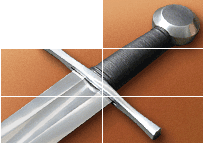
 |
|
|
Del Tin 2153 15th Century Sword
A hands-on review by Björn Hellqvist The Del Tin Armi Antiche DT2153 15th century one-handed sword is one of my absolute favorites. As I like bronze fittings, I was happy to get an old-style DT2153 back in 1996. About four years later, Del Tin changed to steel fittings instead. Del Tin of Italy is one of the veteran makers of production swords, the firm having been in business since 1966. I have ordered many times from Del Tin, and while the waiting list is long (currently around ten months), it is possible to get stock items from the retailers. Overview The sword is inspired by a sword kept in The Metropolitan Museum of Art, NY, and is described in Records of the Medieval Sword (XV.9) and The sword in the Age of Chivalry by Ewart Oakeshott. There are serious doubts about its authenticity, as the blade is considered to be too slender for the intended use: thrusts at armoured targets. The blade shows signs of corrosion, while the hilt parts are in near-perfect shape. It might be a very well-made 19th century fake, but I for one think that it might be genuine—wishful thinking, perhaps. The style is typical for Italian swords from the middle of the 15th century, and the sword is most elegant.  Measurements and Specifications:
Replica created by Del Tin Armi Antiche of Italy. Handling Characteristics The sword is relatively light and handles really well for a production sword. The grip is comfortable. I haven't done any cutting with it, but I think that properly sharpened, it would be able to deal some considerable damage. Compared to original swords of this type that I've handled, it is okay. Fit and Finish The well-shaped grip is made of wood, probably beech, and dyed a dark brown. The blade starts out with a hexagonal cross-section, but changes to a diamond cross-section after about 30% of the blade length. The handsome Type K pommel and curved Style 8 guard are cast, and display slight imperfections (a few very small pits and some other miniscule flaws). The Type XV blade is without any apparent flaws. The replicated sword differs from the original by having a stouter blade and gilt-bronze hilt furniture. The original grip is of greenish-black horn, with gilt-bronze fillets along the sides. The DT2153 resembles the original sword, but is not a direct reproduction. Conclusion All in all, the sword is a very attractive piece, perfect for those who want a shorter sword with flair. If you can pick up the older version with bronze furniture, go for it. The current version, while more durable, isn't as pretty in my eyes, but then that's a matter of taste. About the Author Björn Hellqvist is a Swedish optometrist with an interest in historical European swords. Acknowledgements Photographer: Björn Hellqvist |